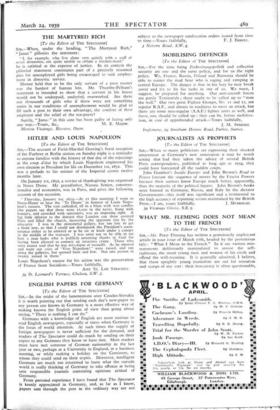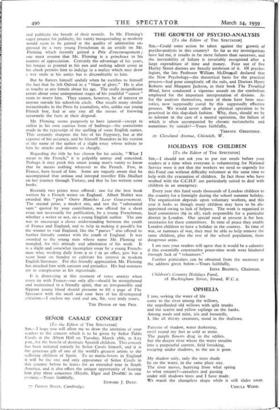WHAT MR. FLEMING DOES NOT MEAN TO THE FRENCH
[To the Editor of THE SPECTATOR] SIR,—Mr. Peter Fleming has written a gratuitously unpleasant article in your issue of March 17th, headed by the pretentious title : "What I Mean to the French." In it are various mis- statements deliberately manipulated to amuse the self- righteous, the smart young men and women of his circle and offend the well-meaning. It is generally admitted, I believe, that these sprightly young journalists are out for sensation and scoops of any sort: their inaccuracy is often questionable,
and publicity the breath of their nostrils. In Mr. Fleming's eager pounce for publicity, his vanity masquerading as modesty would seem to be pained at the quality of admiration ex- pressed by a very young Frenchman in an article on Mr. Fleming which recently gained a Prix d'encouragement ; one must assume that Mr. Fleming is a grincheux in his matters of appreciation. Certainly the advantage of his years, his tongue as pointed as his pen and seeking adroit cover in his cheek permits him to indulge in a malice which may draw a wry smile at his antics but is discreditable to him.
But he flatters himself unduly when he ascribes to himself the fact that he left Oxford in a "blaze of glory." He is also as touchy as any female about his age. The really insignificant errors about some unimportant stages of his youthful " career " seem to worry him. They cannot, however, be of interest to anyone outside his school-tie circle. One recalls many similar inexactitudes in the Press by journalists, who, unlike our young French boy, had at any rate all the means of knowing accurately the facts at their disposal.
Mr. Fleming seems purposely to have ignored—except to utilise in his own curious form of badinage—the corrections made in the typescript of the spelling of some English names. This certainly sharpens the bite of his flippancy, but at the expense of his accuracy, and he himself flounders in his version of the name of the author of a slight essay whose tribute to him he attacks and distorts so cheaply.
Regarding the title he has chosen for his article, "What I mean to the French," it is palpably untrue and conceited. Perhaps it may prick this smart young man's vanity to know that he means nothing whatever to the French. Few, in France, have heard of him. Some are vaguely aware that he accompanied that serious and intrepid traveller Ella Maillart on her journey through Tartary, and that he has written some books.
Recently two prizes were offered: one for the best book written by a French writer on England. Albert Noblet was awarded this " prix " Outre Manche: Leur Gouvernement. The second prize, a modest one, and not the "substantial sum" quoted by your contributor, was offered for a short essay not necessarily for publication, by a young Frenchman, whether a writer or not, on a young English author. The aim was to encourage a closer understanding between the youth of France and England, and to help in making it possib"e for the winner to visit England, like the " purses " also offered to further friendly contact with the youth of England. It was awarded to the young man whose name Mr. Fleming so mangled, for this attitude and admiration of his work. It is a slight and somewhat incomplete essay by a young French- man who, working daily from 9 to 7 in an office, gets but a scant hour on Sunday to cultivate his interest in modem English literature. For this friendly appreciation Mr. Fleming has attacked him with sarcasm and prejudice. His bad manners are as conspicuous as his ingratitude.
It is distressing at this moment of tense anxiety when every tie with France—our only ally—should be strengthened and maintained in a friendly spirit, that an irresponsible and flippant young blood should presume to fill a page of The Spectator with the small and sour beer of his ill-tempered criticism.—I enclose my card and am, Sir, very truly yours,
THE DONOR OF THE PRIX.















































 Previous page
Previous page